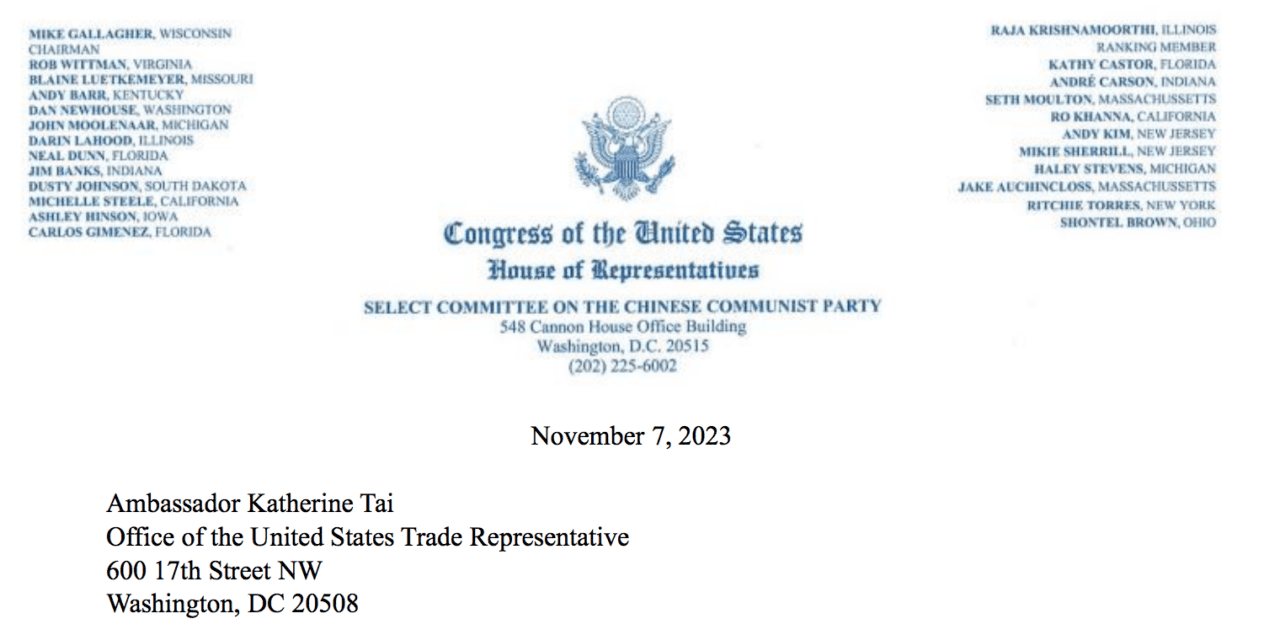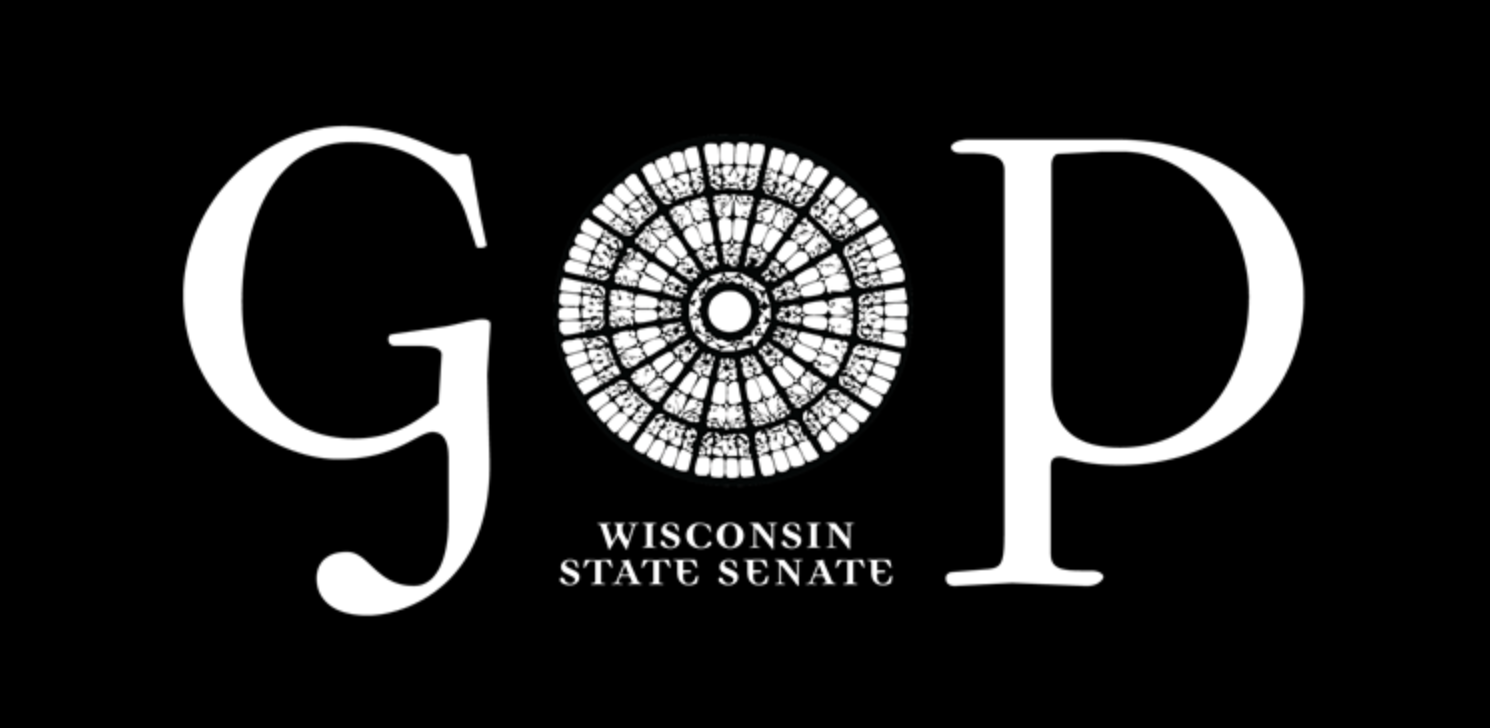From the Press Room
PRESS RELEASE
Gallagher, Krishnamoorthi issue warning automobile exports and the CCP’s strategy to dominate the global market
WASHINGTON, D.C.– As first reported by Reuters, following a first quarter in which China became the world’s largest auto exporter, Rep. Mike Gallagher (R-WI) and Rep. Raja Krishnamoorthi (D-IL), Chairman and Ranking Member of the House Select Committee on the Strategic Competition Between the United States and the Chinese Communist Party, sent a letter to the United States Trade Representative, Ambassador Katherine Tai, with concern about the Chinese Communist Party’s potential plan to flood the US market with automobiles, particularly electric vehicles.
The letter was also penned by Select Committee members Rep. John Moolenaar (R-MI) and Rep. Haley Stevens (D-MI).
The lawmakers write that the PRC auto industry has been “propped up by massive subsidies and long-standing localization and other discriminatory policies employed by the PRC,” and believe that urgent action is needed to counter the PRC’s unfair practices and ensure that automakers and auto workers are able to compete on a level playing field, both here in the United States and globally in this critical industry.
The members request that “the Office of the United States Trade Representative consider whether to launch a new Section 301 investigation into these practices and the harm they pose to the American automotive industry and American workers…” and urge Ambassador Tai to consider “what actions should be taken to counter the PRC’s industrial strategy to dominate the global automobile market.”
View the lawmaker’s full letter to Ambassador Tai or read below.
—
Dear Ambassador Tai,
We are concerned by how the People’s Republic of China (PRC) is preparing to flood the United States and global markets with automobiles, particularly electric vehicles (EV), propped up by massive subsidies and long-standing localization and other discriminatory policies employed by the PRC. We request that the Office of the United States Trade Representative (USTR) consider whether to launch a new Section 301 investigation into these practices and the harm they pose to the American automotive industry and American workers and what actions should be taken to counter the PRC’s industrial strategy to dominate the global automobile market.
For more than a decade, the PRC has given its homegrown automakers an unfair competitive advantage, providing them with discriminatory government subsidies and preferential market access policies, while pressuring foreign automotive firms to localize and transfer their core technologies to PRC firms. While the PRC strategy is not new, the threat this long-standing push now poses to U.S. and global auto markets is unmistakable, as PRC automakers leverage the unlevel playing field in their home market to expand into global markets. PRC EV exports have surged 851 percent in the past three years, mainly to Europe. Last quarter, for the first time in history, the PRC became the world’s largest auto exporter. Urgent action is needed to counter the PRC’s unfair practices and ensure that U.S. automakers and auto workers are able to compete on a level playing field, both here in the United States and globally in this critical industry.
The PRC’s Made in China 2025 plan, released in 2015, sets out specific domestic and global market share targets that PRC industries are to achieve in ten advanced industries, including in electric vehicles. It has become apparent that these goals formed the basis of a well-orchestrated plan to use all levers of the PRC government to achieve global dominance in the industries of the 21st century and catapult the PRC’s competitive position in the global manufacturing value chain. Made in China 2025 and the PRC’s Mid-to-Long-term Automotive Plan released in 2017 specifically called for PRC brands to become world leaders by 2025. With China now the world’s largest electric vehicle market, the PRC represents 60% of global electric car sales.
We are also concerned by recent reports that PRC automakers continually receive enormous government financing, which is a consistent feature of the PRC’s State-led economic model. For example, the PRC EV manufacturer NIO reportedly lost $835 million in the second quarter, but has been able to survive given substantial government backing totaling at least $2.6 billion. The PRC has also used its State-led economic model to maintain a fierce grip on the raw materials needed for battery production. With the PRC controlling nearly 76 percent of global battery cell production capacity, the PRC government has ensured that PRC automakers have a strategic advantage in their ability to build EVs at lower prices.
The United States has thus far been spared by a surge of PRC vehicles because PRC vehicles are ineligible for tax credits under the Inflation Reduction Act and because of the additional 25 percent tariffs on PRC-imported vehicles put in place under Section 301 in 2018. We applaud the Biden Administration for maintaining these tariffs on PRC automobiles. It is critical that tariffs on PRC automobiles not only be maintained but also increased to stem the expected surge in PRC imports. If PRC automakers are able to withstand sustained losses with the support of the PRC government, it is only a matter of time before PRC manufacturers will be able to absorb the additional 25 percent tariff on PRC vehicles to access the U.S. market.
Indeed, the European Union has recently launched an investigation into PRC subsidies to the automobile industry for this same reason. The United States must work together with our trading partners to take coordinated countermeasures to address our common concerns about the PRC’s unfair policies in the auto sector, as USTR has been doing in other sectors, such as steel and aluminum, where PRC excess capacity has already done damage to global markets. The only way to effectively counter the PRC’s sustained push to achieve global domination is to impose a coordinated response that collectively dampens demand in our markets, rather than rewarding the PRC for its State-led economic model.
We are also concerned that the PRC government has directed and pressured foreign automakers to localize and export PRC-made vehicles to global markets, including the United States, from the PRC. The PRC’s long-standing ambition to promote national champions has now been transformed into an updated strategy to absorb the global automobile value chains. For example, many of the EVs exported from the PRC are made by Western brands, such as Tesla, that have significant production capacity in the PRC. Furthermore, U.S. automakers are starting to shift the production of vehicles for the U.S. market to the PRC, such as the Buick Envision and the Lincoln Nautilus. The trend of shifting production from the United States to the PRC underscores that the current tariff level on imported vehicles from the PRC is insufficient.
However, tariffs on vehicles from the PRC alone will not solve the problem, as the PRC seeks to circumvent tariffs through a variety of means, including transshipment and overseas production in third-countries. The United States must also be prepared to address the coming wave of PRC vehicles that will be exported from our other trading partners, such as Mexico, as PRC automakers look to strategically establish operations outside of the PRC to take advantage of preferential access to the U.S. market through our free trade agreements and circumvent any PRC-specific tariffs. Indeed, PRC automakers BYD, Chery, and SAIC Motors have already established themselves in Mexico. NIO has already announced that it plans to enter the U.S. market by 2025. We look forward to USTR’s response on whether the current rules of origin in our trade agreements need to be strengthened and what other policy tools are needed to prevent the PRC from gaining a backdoor to the U.S. market through our key trading partners.
The PRC should not be allowed to use massive subsidies and other market-distorting policies to exploit the global transition to EVs and the openness of the U.S. economy. As the PRC plans to cash in on its investment in Made in China 2025, decisive action must be taken to ensure that we do not once again stumble into a critical dependency on the PRC resulting in the hollowing out of the American auto industry. We look forward to your prompt response to this pressing issue.
Thank you for your attention to this important matter and prompt reply.














